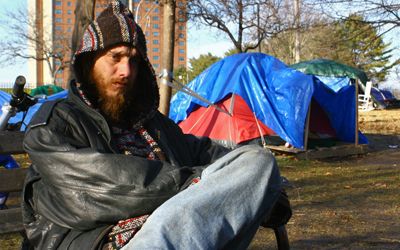Occupy Maine holding ground
 Photo/Matt Dodge
Matt Coffey, an Occupy Maine resident, believes a buy-local initiative will help rebalance Maine's economy
Photo/Matt Dodge
Matt Coffey, an Occupy Maine resident, believes a buy-local initiative will help rebalance Maine's economy
Sparked in New York City in September, the Occupy movement has spread globally, branding itself a people's opposition to a perceived epidemic of corporate greed and pro-business policymaking in federal and state governments.
In Portland, protesters have camped in Lincoln Park on Congress Street since Oct. 2, holding demonstrations to raise awareness around issues of social justice, corporate personhood, the draining of Maine's natural resources and an influx of out-of-state garbage. The city denied an overnight camping permit to the group in early December, prompting a series of legal challenges that remain unresolved while Occupy Maine holds its ground.
In the meantime, occupiers embrace a broad range of viewpoints and a communal decision-making structure that make pinning down goals and progress difficult. An Oct. 1 press release from the group outlined
four Maine goals: making oil affordable; bringing home the Maine National Guard; amending corporate personhood; and creating better public transportation. But after months of protest, the group tends to identify priorities on a day-to-day basis, reflecting the consensus of decisions reached at thrice weekly general assembly meetings.
For some, it's a vested interest in preserving social welfare programs like MaineCare and food stamps that has kept them coming back night after night. Others take a more corporate view, embracing the “Buy Local” ethos as a sustainable business philosophy. “We're hoping to improve business in the local sense by keeping money in businesses that are in Maine, for Maine, that employ Maine people,” says Occupy Maine resident Matt Coffey.
The movement has received support from small local businesses, with Coffee By Design, Spartan Grill, Domino's Pizza, and Local Sprouts Co-Operative donating food and a place to get warm, while others have offered financial support. The group maintains a website that shows about $1,000 in contributions since the protest started.
Other occupiers are making a plug for a co-operative business model to counter the prevalence of a capitalist, market-driven model. “There are all sorts of things that we haven't tried yet, [like] just trying to be decent people and helping each other out without worrying about whether you're going to make a profit off of it,” says occupier Deseree Tanguay.
The emphasis on co-ops is one binding theme among the nation's Occupy groups, which helped to promote Nov. 5 as National Bank Transfer Day, encouraging those with accounts in some of the country's larger banks to transfer their funds to a local credit union. ABC News reported about 1 million Americans heeded the call and made the switch to credit unions. Here in Maine, about 80% of credit unions that belong to the Maine Credit Union League reported increased activity in early November, but the official numbers won't be known until later this month when the league compiles its fourth quarter results, says President John Murphy.
“We've seen a strong interest because of people's disillusionment with bank fees, which I don't necessarily attribute to the Occupy movement,” he says. “But the awareness created by the Bank Transfer Day reminded people they have choices and I think we benefited from that media attention.”
Although its numbers have dwindled as temperatures drop, the Occupy Maine intends to remain. From Jan. 6 to 10, there was a call to join occupiers in Manchester, N.H., to draw attention to their agenda during the New Hampshire Primary. The group has actively protested corporate personhood, which grants corporations the same constitutional protections as people, an especially divisive issue around campaign contributions.
The movement also serves as a platform for a laundry list of Maine-based corporate complaints that bond many of the occupiers.
“We have Nestle buying up a chunk of our water, we ship a large amount of our power down to Boston to sell off the excess and we're allowing neighboring states to bring their trash up here and toss it in our dumps,” says Occupy Maine resident Evan McVeigh.
Some say the organization of the movement itself is a good example of the type of change they would like to see.
“I think this participatory structure is the revolution,” says occupier and serial entrepreneur Rachel Rumson.
Rumson, who is also the finance committee director for Occupy Maine, says the state would do well to recognize resources right under its nose, specifically, its unemployed and underemployed.
Having started nine companies, Rumson currently runs a small business consulting firm called Cultivating Leadership, a leadership model that, she suggests, could be adopted by the state to help decrease Maine's unemployment rate.
“I would like to see entrepreneurial workshops done with the unemployed. If you put me in a room and gave me 350 unemployed people, where I could do a full inventory of their skill sets, I could actually find businesses and train them to work co-operatively,” says Rumson.
In the past, she has launched a system engineering firm called iCore, a cleaning business called Attention to Detail, a Falmouth fitness studio and a painting company, Useful Hands.
Rumson sees a return to the small business model as a potential revolution in the modern marketplace. “There are economies of more humanistic quality,” she says.
“Peoples' brains light up when they walk into the occupation movement and they have a voice; they have a job today, they have purpose, they have value. Nowhere else in society [are they hearing that] and that is a shame, that's the biggest deficit we have. It's not the economic deficit, it's not the federal deficit, it's the humanity deficit,” she says. n










Comments